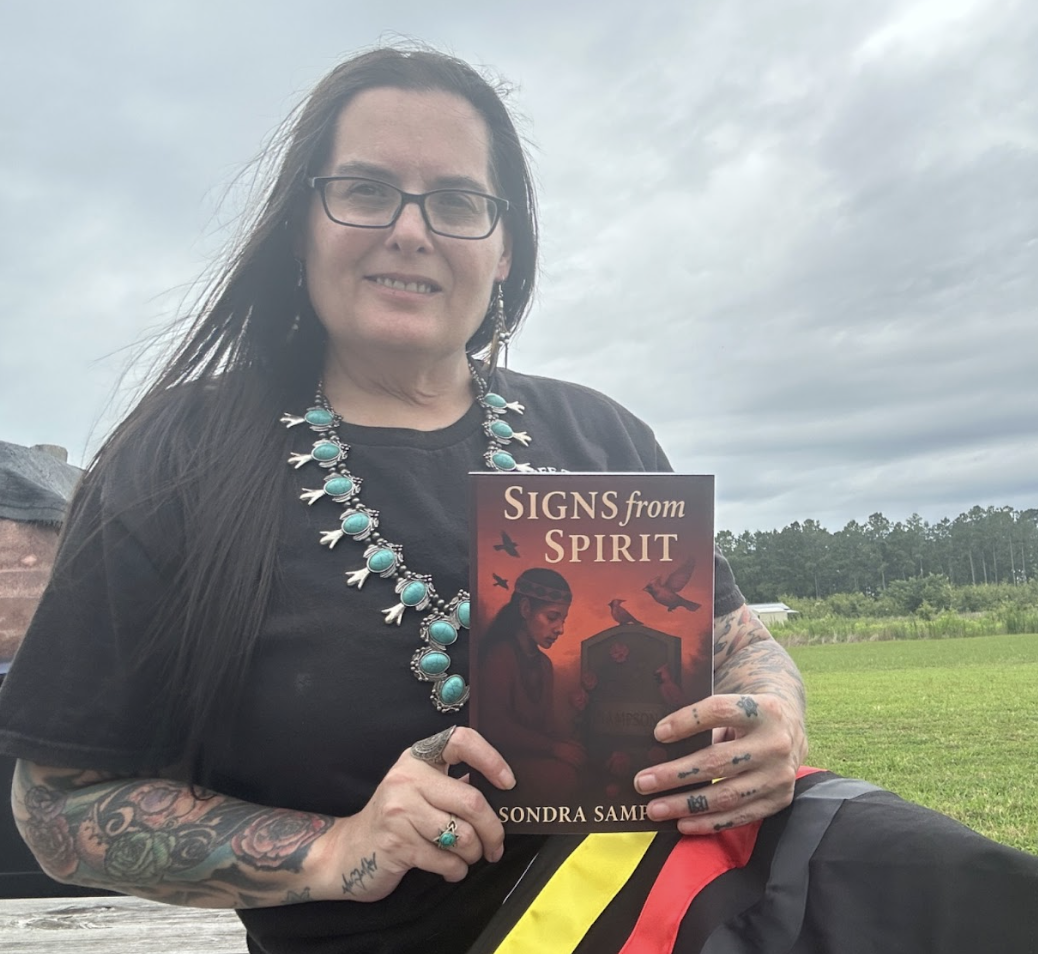
- Details
- By Kaili Berg
Sondra Sampson, a proud Lumbee woman and Deaf author from Laurinburg, North Carolina, is using storytelling to give voice to grief, survival, and Indigenous identity.
Deaf since 18 months old due to spinal meningitis, Sampson spent years in silence before discovering the power of sign language. But even in that quiet, she was deeply attuned—to her mother’s sorrow, her community’s resilience, and the land that shaped her.
“I didn’t grow up seeing Deaf Native girls in books,” Sampson told Native News Online. “So I became the woman who wrote them.”
Now a mother of five and a graduate of the Model Secondary School for the Deaf in Washington, D.C., Sampson has carved her own path in publishing through her imprint, Silent Feather Press.
“The feather represents healing, presence, and connection,” she explained. “It’s more than a logo—it’s the spirit behind my work.”
Her latest book, Luski’s Silent Girl, tells the story of Tala, a Deaf Lumbee girl who survives a tragic fire that claims her father’s life. Guided by a mysterious black wolf named Luski, Tala embarks on a journey of justice and healing.
Sampson’s debut, Signs from the Spirit, is a spiritual memoir honoring her late father, Charles Graham Sampson. She followed it with The Sign of Victoria, a supernatural thriller exploring ancestral trauma and buried truths.
“These stories are more than just books,” she said. “They’re medicine. They preserve Lumbee identity, share the Deaf experience, and make space for voices often left out of Native literature.”
Recently, Sampson visited the Lumbee Tribal Office to present a copy of Signs from the Spirit to Tribal Chairman John Lowery. She explained that the book was written to help others navigate grief. Moved by her gift, Chairman Lowery—an avid reader himself—presented Sampson with one of his charge coins and told her she had inspired him to start writing.
Joined by two of her five children, Sampson also shared that she’s already working on her next book. Her titles are available through Amazon, Barnes & Noble, and other major retailers.
Beyond writing, Sampson is a passionate advocate for H.R. 474—the Lumbee Recognition Act—and uses her platform to raise awareness about the ongoing fight for full federal recognition.
“As a Deaf woman, I know what it means to be unheard,” she said. “That’s why I speak through my work. I believe books, stories, and Native media can help lead this movement.”
More Stories Like This
Two Indigenous Group Exhibits Opening January 9, 2026 at WatermarkWatermark Art Center to Host “Minwaajimowinan — Good Stories” Exhibition
Museums Alaska Awards More Than $200,000 to 12 Cultural Organizations Statewide
Zuni Youth Enrichment Project Takes Top Emerging Artist Apprentices to Phoenix for Artistic Exploration and Cultural Immersion
From Dishwasher to Award-Winning Chef: Laguna Pueblo's Josh Aragon Serves Up Albuquerque's Best Green Chile Stew
Help us defend tribal sovereignty.
At Native News Online, our mission is rooted in telling the stories that strengthen sovereignty and uplift Indigenous voices — not just at year’s end, but every single day.
Because of your generosity last year, we were able to keep our reporters on the ground in tribal communities, at national gatherings and in the halls of Congress — covering the issues that matter most to Indian Country: sovereignty, culture, education, health and economic opportunity.
That support sustained us through a tough year in 2025. Now, as we look to the year ahead, we need your help right now to ensure warrior journalism remains strong — reporting that defends tribal sovereignty, amplifies Native truth, and holds power accountable.
 The stakes couldn't be higher. Your support keeps Native voices heard, Native stories told and Native sovereignty defended.
The stakes couldn't be higher. Your support keeps Native voices heard, Native stories told and Native sovereignty defended.
Stand with Warrior Journalism today.
Levi Rickert (Potawatomi), Editor & Publisher

